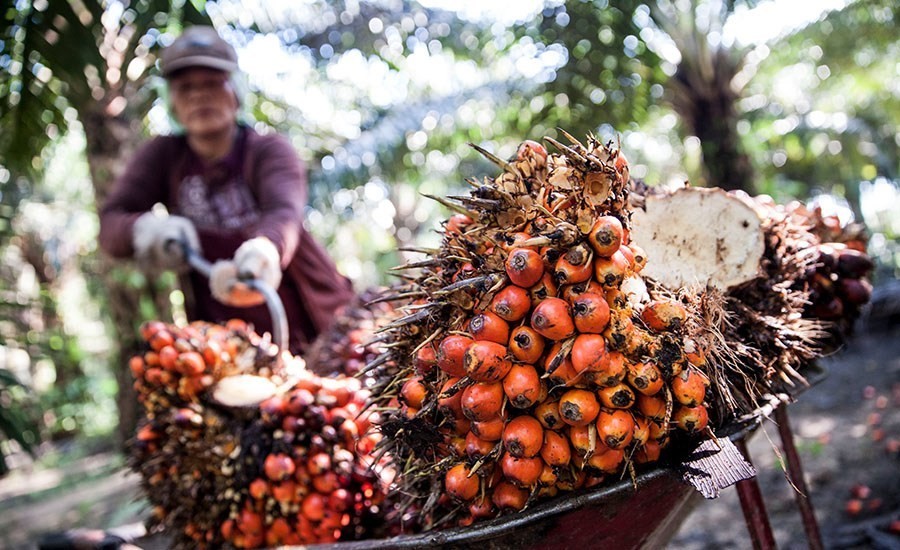Blog by: Vikalp Sabhlok – GGGI Senior Officer – Investment, Forest & land Use Asia
One of the biggest challenges for palm oil as a commodity is that of establishing traceability and sustainability. Indonesia supplies close to 45% of the world demand for palm oil. Over the last two decades, in Indonesia, the palm oil sector has grown tremendously, but this has also resulted in clearing rainforests and draining peatlands, thereby making the palm oil crop having one of the highest GHG emissions impacts as an agricultural crop.
Dealing with information asymmetry
Averaged over the last three years, palm-driven land use and land-use change in Indonesia and Malaysia has emitted roughly 500 million tonnes of CO2e each year, contributing 1.4% of global net CO2e emissions. On the demand side, India, China and the EU are amongst the biggest consumers of palm oil. Recently, the EU has passed laws that mandate a phase out of palm oil (used as biofuel) from the transportation sector by 2030. This decision would have substantial impact as more than 60% of all EU imported palm oil is used as biofuel. On the supply side, the smallholder farmers are usually missing clear land titles, access to formal financial services, face lack of awareness and capacity for sustainable practices. The larger companies remain dependent upon the traders and middlemen to source palm oil fruit and find it hard to establish sustainability because of very high information asymmetry.
Fostering sustainability mechanisms
For the consumers, and consumer-facing companies, existing sustainability mechanisms like the Roundtable on Sustainable Palm Oil (RSPO) and the Indonesian Sustainable Palm Oil system (ISPO) are the only third-party mechanisms to verify and trace the sustainability of the consumed/procured palm oil.
Establishing and maintaining the traceability of palm oil across the value chain is very complex because of a multitude of factors – complex value chains with multiple middlemen, regulatory challenges, lack of consumer awareness etc. Without a transparent and robust system of traceability, it is almost impossible to establish if the palm oil has been produced sustainably.
Digitizing palm oil production
What is the blockchain technology-based initiative – Palm-Oil-Block (POB). The first problem to be solved by POB would be the traceability issues associated with the sector. This would include working across the supply chain with different actors to establish the traceability for sustainable palm oil. It would work with the growers to ‘digitize’ all sources of palm oil fruit (based on geo-tagging, growers’ details, land permits, etc.) – starting from large companies and smallholder farmers. Once the traceability for the source is established, it would work with mills and refiners to ‘retrofit’ technologies that build and maintain traceability records for the palm oil, even as it flows through the supply chain. In the end, it would work with the companies to implement new consumer-interactive packaging for the product that helps consumers understand and become more aware of the products’ sustainability.
Once a ‘digital palm oil’ asset is created at the farm level, the asset would be traced through the entire value chain as it undergoes ‘change-in-forms’ from fruit to oil to refined products. This is similar to a segregated supply chain system under RSPO practices. The IT systems across the value chain would be configured to exclude any palm oil which doesn’t carry a digital identity. Thus, each change-in-form could be traceable back to the original digital asset created at the farm level.
Looking at digital palm oil results
Significant ‘last-mile challenges’ are anticipated at the farm level. The POB team could allocate resources in verifying, investigating and maintaining the integrity of farm level processes and operations. Risk assessments could be further supplemented using tools like satellite imagery, random audits, and using social design schemes. Learning could also be derived from technology platforms like Airbnb that face similar problems in maintaining the quality of operations for a distributed system. Another last mile problem will be to integrate the blockchain platform and IT systems across the value chain. Theoretically retrofitting the palm oil mill/refinery operations with new technologies is feasible, but requires further assessment.
A New Ecosystem based on Sustainable consumerism
Over the long term, POB aims to create a new ecosystem for ‘sustainable consumerism’. POB could minimize the distance between the end consumers and growers to enable higher value interactions between the consumer, brand owner and the growers. The objective would be to minimize the ‘network power’ of current middlemen in the palm oil value chain (traders, mill owners, refiners etc.). With the advent of mobile phones, industries are becoming customer-centric and the POB initiative could enable traditional consumer-facing companies to also move in this direction. Bringing this ‘consumer visibility’ into the current supply chains enable a move towards sustainable and responsible consumerism. For consumer-facing companies, this is a mechanism to start building a sustainability-based competitive advantage in the market, while pushing for a deforestation-free commodity supply chain.
The views expressed in this article are those of the author alone and not the Tropical Forest Alliance.a
Ref: https://www.tfa2020.org/en/blockchain-technology-indonesias-palm-oil-sector/
